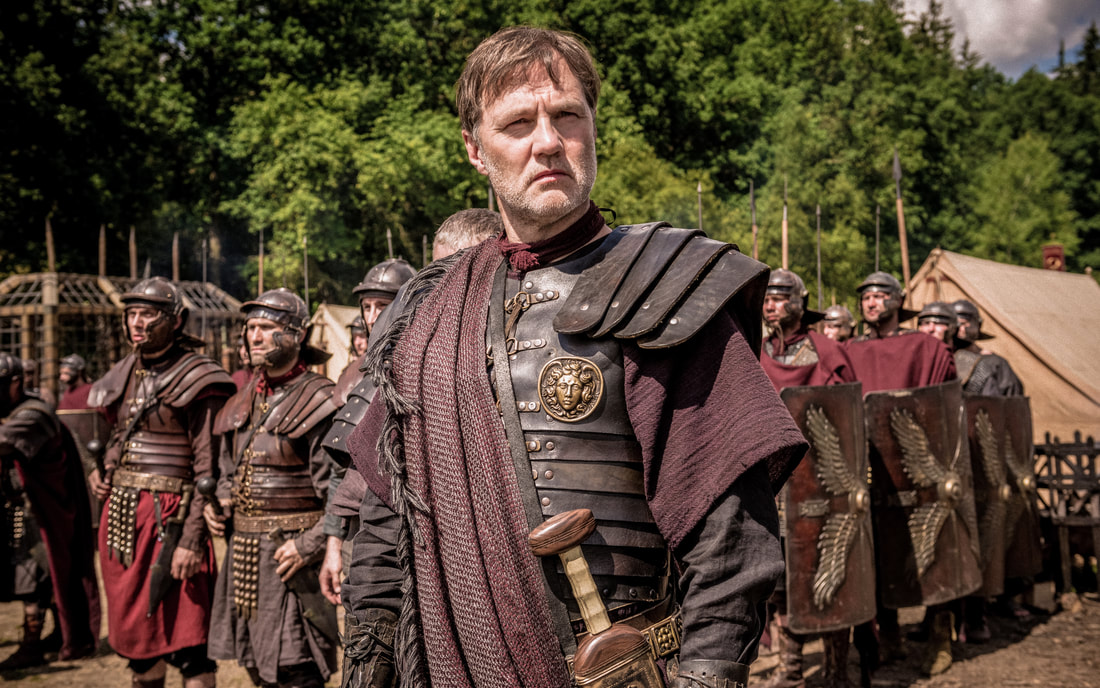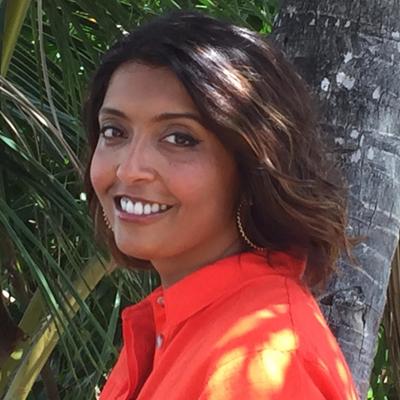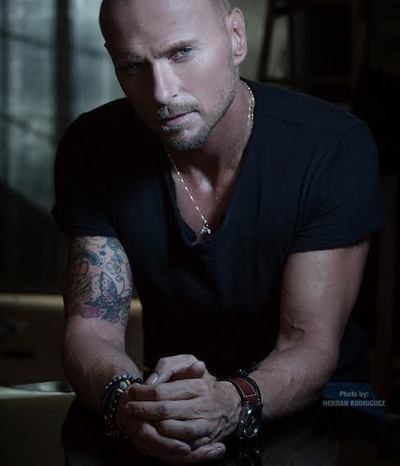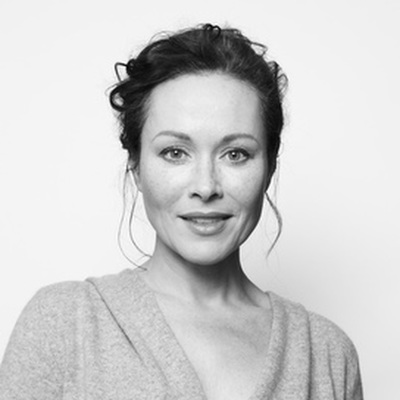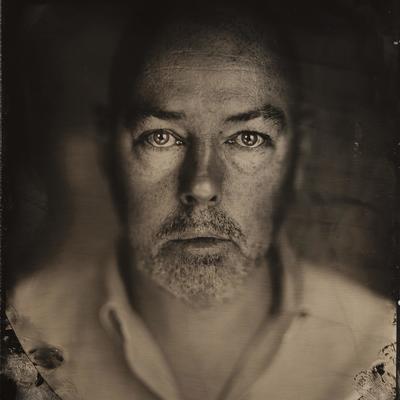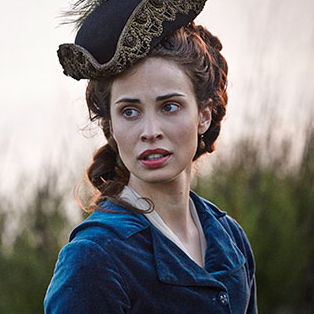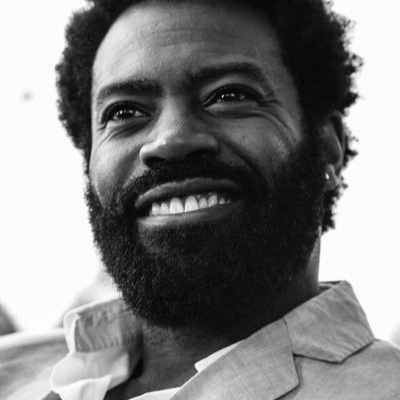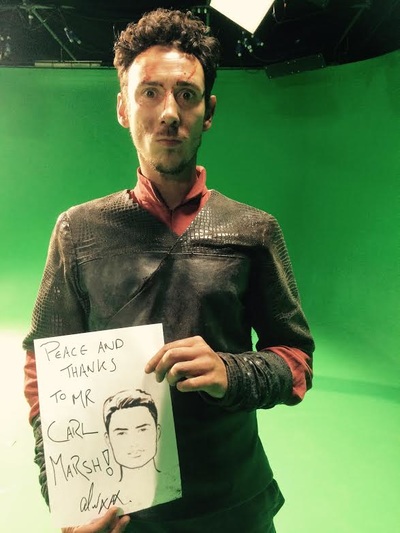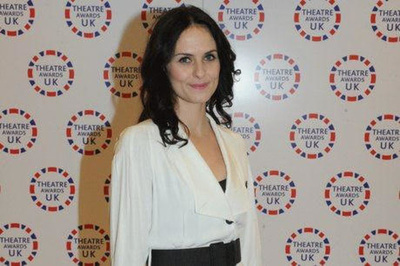David Morrissey
|
January 2018 | by Carl Marsh
|
|
David Morrissey, I don't think this guy needs much introduction! I got to speak with him at the press junket for his new show Britannia which is now on Sky Atlantic in the UK and Amazon Prime in the US.
Perhaps a no-brainer but what actually attracted you to the role of Aulus Plautius in Britannia?
It was before I even read the script, it was once I knew that Jez Butterworth was connected to it as I have been a fan of his writing for a very long time. I knew that this period in British history is something that he has researched a lot. I loved Jerusalem, I’ve seen it about 5 times. He is a writer that I had wanted to work with for a very long time. I spoke to him on the phone, and he just outlined the character and what he wanted to do with it and where he wanted to take it, so it was just wonderful to go to work with him really.
Your character has to be a strong and utterly believable character, one that did indeed stop the mutiny of his men as most feared invading what is now Great Britain; how did you prepare for this role knowing all this and the impact you needed to make sure the character had on the other actors?
One of the great things about it was that I know that Jez Butterworth is a writer that likes character; some writers are very plot driven or very story driven, he is that as well but he always comes back to the character. He gave me great dialogue, and it’s dialogue I could play with, and there is the idea in there of having someone who has commanding dialogue but also is slightly off-piste, he's going against the norm, you get to know that his men are people who want to follow him but they are worried that he is going native, that he just has to constantly come back that, and you see the brutality of him, you see the fact that there is something unhinged in the man in a way that is sort of like Robert Duvall in Apocalypse Now, you feel he is slightly, and I am not saying he is suffering from PTSD in any way but this is a man that has seen terrible things, and it will have had an effect on him. So there’s this public side which his soldiers see when they first start to follow him until they start to get slightly thrown by that. Then there is this private side of him which is on this spiritual quest, which is very much like another character in Apocalypse Now called Colonel Kurtz played by Marlon Brando, of just taking himself to this dark spiritual place to see what he can gleam there really.
You touched on it then with what Jez Butterworth obviously wanted with your performance in character but were you yourself given much freedom with the role apart from the dialogue that you could play with?
With this role there was no need, I know I have done that in the past but with Jez, his dialogue is so great that there is really no reason to change any of it. He and I would talk about stuff like character development and where he would take the character, and I would talk about my feelings about that but really, once the script came, unlike a lot of scripts, there was not a lot you needed to do with the dialogue. As a playwright he knows how to drive a story via dialogue, which is fantastic. Also, he is not frightened of speeches or big scenes where you are putting actors in scenes together where they have to drive it through, I found that a real joy to perform, particularly with people like Zoë Wanamaker and being able to perform big scenes with her, it was just wonderful for me.
With you mentioning Zoë’s character, her first words spoken to your character at the first meeting of the pair will go down in TV folklore no doubt, that must have been a long day of retakes!
No, it didn't really because one reason was that at one point we were all siting on ant hills which was quite crazy but although I think there is something quite contemporary in her language but also something quite real. It throws him really, because he grew up in a very male patriotically society and he arrives in this place where the women are the leaders, they are not only leaders but they are ruthless, they are aggressive, that slightly throws him and he doesn't know what to do with that. So it’s very important that she is like that to confuse my character, and it will also have this effect on the audience as well. Rome slightly represents this sophisticated society but when he arrives in Britain, there is nothing polite about it.
Perhaps a no-brainer but what actually attracted you to the role of Aulus Plautius in Britannia?
It was before I even read the script, it was once I knew that Jez Butterworth was connected to it as I have been a fan of his writing for a very long time. I knew that this period in British history is something that he has researched a lot. I loved Jerusalem, I’ve seen it about 5 times. He is a writer that I had wanted to work with for a very long time. I spoke to him on the phone, and he just outlined the character and what he wanted to do with it and where he wanted to take it, so it was just wonderful to go to work with him really.
Your character has to be a strong and utterly believable character, one that did indeed stop the mutiny of his men as most feared invading what is now Great Britain; how did you prepare for this role knowing all this and the impact you needed to make sure the character had on the other actors?
One of the great things about it was that I know that Jez Butterworth is a writer that likes character; some writers are very plot driven or very story driven, he is that as well but he always comes back to the character. He gave me great dialogue, and it’s dialogue I could play with, and there is the idea in there of having someone who has commanding dialogue but also is slightly off-piste, he's going against the norm, you get to know that his men are people who want to follow him but they are worried that he is going native, that he just has to constantly come back that, and you see the brutality of him, you see the fact that there is something unhinged in the man in a way that is sort of like Robert Duvall in Apocalypse Now, you feel he is slightly, and I am not saying he is suffering from PTSD in any way but this is a man that has seen terrible things, and it will have had an effect on him. So there’s this public side which his soldiers see when they first start to follow him until they start to get slightly thrown by that. Then there is this private side of him which is on this spiritual quest, which is very much like another character in Apocalypse Now called Colonel Kurtz played by Marlon Brando, of just taking himself to this dark spiritual place to see what he can gleam there really.
You touched on it then with what Jez Butterworth obviously wanted with your performance in character but were you yourself given much freedom with the role apart from the dialogue that you could play with?
With this role there was no need, I know I have done that in the past but with Jez, his dialogue is so great that there is really no reason to change any of it. He and I would talk about stuff like character development and where he would take the character, and I would talk about my feelings about that but really, once the script came, unlike a lot of scripts, there was not a lot you needed to do with the dialogue. As a playwright he knows how to drive a story via dialogue, which is fantastic. Also, he is not frightened of speeches or big scenes where you are putting actors in scenes together where they have to drive it through, I found that a real joy to perform, particularly with people like Zoë Wanamaker and being able to perform big scenes with her, it was just wonderful for me.
With you mentioning Zoë’s character, her first words spoken to your character at the first meeting of the pair will go down in TV folklore no doubt, that must have been a long day of retakes!
No, it didn't really because one reason was that at one point we were all siting on ant hills which was quite crazy but although I think there is something quite contemporary in her language but also something quite real. It throws him really, because he grew up in a very male patriotically society and he arrives in this place where the women are the leaders, they are not only leaders but they are ruthless, they are aggressive, that slightly throws him and he doesn't know what to do with that. So it’s very important that she is like that to confuse my character, and it will also have this effect on the audience as well. Rome slightly represents this sophisticated society but when he arrives in Britain, there is nothing polite about it.
For you, what was the greatest challenge of doing Britannia?
For me personally it was the idea of having someone who was following a personal agenda inside a concrete force, he had to be something to his men but also what he was doing was following something else which was this spiritual quest for something like immortality. By having that complexity between him of someone who is appearing to be one thing, and then another, and where is he at any one time in that personal journey. He is a man who is out for discovery, and he will sacrifice himself in order to have that discovery. Its a very, almost scientific like obsession he has for this discovery of what these people have, what these Druids possess. He wants that. And there is this psychological breakdown inside the man, so that is what I was there to pursue.
Did you even know the fate of your own character before shooting commenced?
I knew the ballpark peaks and troughs of him but I didn’t know how he got there, or the ‘in’s and outs’ of him but I knew the structure of the character. You know I’ve worked on shows where I’ve known the structure and that hasn't panned out where something has happened, leading to a change. With my character on this show, that wasn't the case as the story that Jez told me on the phone before we had started, is the story that played out in front of me when we were filming.
So it was all structured before filming commenced?
Yes, I think what Jez had was that but what he really needed to do was finesse it, so we got the scripts as we were going along but in good time, not on the morning we started it. I think he was tinkering with it, and like all writers, and I’ve grown to like this as an actor is if you are in a big series which is a 9 parter or like in The Walking Dead where we shoot 16 parts, then the writers like to see the rushes and the dailies because surprising things will come out of the shooting. So if your writers are too rigid going down the line, then they are not developing what is in front of them. Its a fine line between having a structure that you can build on and certainly for design teams that can go forward and create the sets, but there has to be some sort of flexibility in there to be open to the elements of surprise about whats coming out in the shooting of it, and the characters and the chemistry, thats happening on screen.
Has this role ever come close to anything you have portrayed before?
It felt very different for me and although I tend to play guys in charge, and there was something familiar in that, but it’s a very different sort of journey he makes. He is part of a massive army, he is part of an empire force, so the fact that he had the might of Rome on his side, there is nothing ad hoc about him, there is nothing spontaneous about him as far as his conquering ideas are concerned. These men and this army have done it many times before, so that was different but the fact that inside him there was a personal and very much a spiritual side to him, now that was new, and I was very excited by that.
Without me knowing the outcome of your character, would you be up for doing another series?
Well…, yes is the short answer, I would be up for working with Jez as I really loved the world, and my experience on the show was really joyous, I loved the character. But as you said, I can’t really give anything away about the story line. As far as the character was concerned, I loved it, that’s all I can say really.
@davemorrissey64
For me personally it was the idea of having someone who was following a personal agenda inside a concrete force, he had to be something to his men but also what he was doing was following something else which was this spiritual quest for something like immortality. By having that complexity between him of someone who is appearing to be one thing, and then another, and where is he at any one time in that personal journey. He is a man who is out for discovery, and he will sacrifice himself in order to have that discovery. Its a very, almost scientific like obsession he has for this discovery of what these people have, what these Druids possess. He wants that. And there is this psychological breakdown inside the man, so that is what I was there to pursue.
Did you even know the fate of your own character before shooting commenced?
I knew the ballpark peaks and troughs of him but I didn’t know how he got there, or the ‘in’s and outs’ of him but I knew the structure of the character. You know I’ve worked on shows where I’ve known the structure and that hasn't panned out where something has happened, leading to a change. With my character on this show, that wasn't the case as the story that Jez told me on the phone before we had started, is the story that played out in front of me when we were filming.
So it was all structured before filming commenced?
Yes, I think what Jez had was that but what he really needed to do was finesse it, so we got the scripts as we were going along but in good time, not on the morning we started it. I think he was tinkering with it, and like all writers, and I’ve grown to like this as an actor is if you are in a big series which is a 9 parter or like in The Walking Dead where we shoot 16 parts, then the writers like to see the rushes and the dailies because surprising things will come out of the shooting. So if your writers are too rigid going down the line, then they are not developing what is in front of them. Its a fine line between having a structure that you can build on and certainly for design teams that can go forward and create the sets, but there has to be some sort of flexibility in there to be open to the elements of surprise about whats coming out in the shooting of it, and the characters and the chemistry, thats happening on screen.
Has this role ever come close to anything you have portrayed before?
It felt very different for me and although I tend to play guys in charge, and there was something familiar in that, but it’s a very different sort of journey he makes. He is part of a massive army, he is part of an empire force, so the fact that he had the might of Rome on his side, there is nothing ad hoc about him, there is nothing spontaneous about him as far as his conquering ideas are concerned. These men and this army have done it many times before, so that was different but the fact that inside him there was a personal and very much a spiritual side to him, now that was new, and I was very excited by that.
Without me knowing the outcome of your character, would you be up for doing another series?
Well…, yes is the short answer, I would be up for working with Jez as I really loved the world, and my experience on the show was really joyous, I loved the character. But as you said, I can’t really give anything away about the story line. As far as the character was concerned, I loved it, that’s all I can say really.
@davemorrissey64
